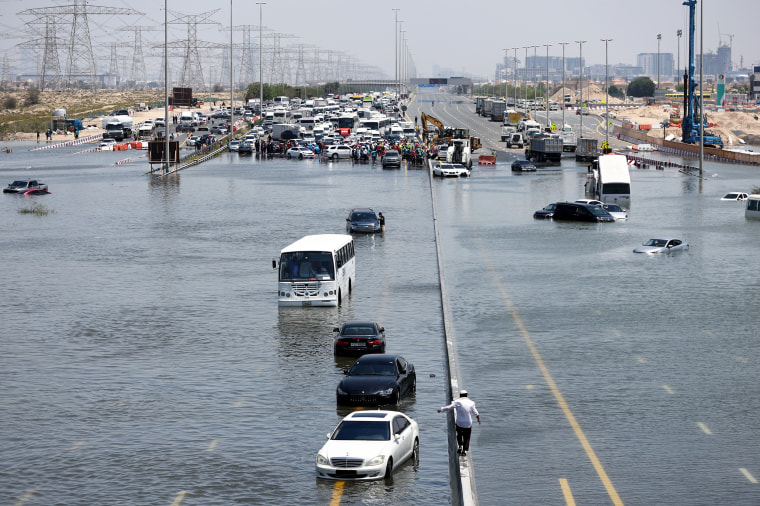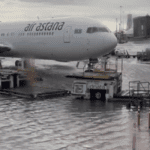Emirates, Dubai’s flagship carrier, and sister airline flydubai have resumed normal operations after heavy rains caused significant flooding across the UAE earlier this week, the airlines announced on Saturday.
Emirates canceled roughly 400 flights and delayed many more due to a record storm that lashed the desert city of Dubai on Tuesday, according to a statement from the airline’s president, Tim Clark.
Thousands of passengers were left stranded as the airline stopped accepting check-ins for passengers leaving Dubai and stopped operating through Dubai International Airport, a significant hub for international travel, due to the storm’s impact.

After the storm flooded taxiways and caused flight delays, cancellations, and diversions, the airport has found it difficult to resume regular operations.
Following the weather-related disruption, Flydubai also resumed its full flight schedule from the airport’s Terminals 2 and 3 on Saturday, according to an airline representative.
The UAE has suffered the impact of the flooding for days, with roads between the city and Abu Dhabi still partially under water as of Saturday.
In Abu Dhabi, some supermarkets and restaurants faced product shortages, unable to receive deliveries from Dubai.

Researchers have linked extreme weather events such as Tuesday’s storm to climate change and anticipate that global warming will lead to higher temperatures, increased humidity and a greater risk of flooding in parts of the Gulf region.
Emirates, Dubai’s flagship carrier, and sister airline flydubai have resumed normal operations after heavy rains caused significant flooding across the UAE earlier this week, the airlines announced on Saturday.
Emirates canceled roughly 400 flights and delayed many more due to a record storm that lashed the desert city of Dubai on Tuesday, according to a statement from the airline’s president, Tim Clark.
Thousands of passengers were left stranded as the airline stopped accepting check-ins for passengers leaving Dubai and stopped operating through Dubai International Airport, a significant hub for international travel, due to the storm’s impact.

After the storm flooded taxiways and caused flight delays, cancellations, and diversions, the airport has found it difficult to resume regular operations.
Following the weather-related disruption, Flydubai also resumed its full flight schedule from the airport’s Terminals 2 and 3 on Saturday, according to an airline representative.
The UAE has suffered the impact of the flooding for days, with roads between the city and Abu Dhabi still partially under water as of Saturday.
In Abu Dhabi, some supermarkets and restaurants faced product shortages, unable to receive deliveries from Dubai.

Researchers have linked extreme weather events such as Tuesday’s storm to climate change and anticipate that global warming will lead to higher temperatures, increased humidity and a greater risk of flooding in parts of the Gulf region.
Emirates, Dubai’s flagship carrier, and sister airline flydubai have resumed normal operations after heavy rains caused significant flooding across the UAE earlier this week, the airlines announced on Saturday.
Emirates canceled roughly 400 flights and delayed many more due to a record storm that lashed the desert city of Dubai on Tuesday, according to a statement from the airline’s president, Tim Clark.
Thousands of passengers were left stranded as the airline stopped accepting check-ins for passengers leaving Dubai and stopped operating through Dubai International Airport, a significant hub for international travel, due to the storm’s impact.

After the storm flooded taxiways and caused flight delays, cancellations, and diversions, the airport has found it difficult to resume regular operations.
Following the weather-related disruption, Flydubai also resumed its full flight schedule from the airport’s Terminals 2 and 3 on Saturday, according to an airline representative.
The UAE has suffered the impact of the flooding for days, with roads between the city and Abu Dhabi still partially under water as of Saturday.
In Abu Dhabi, some supermarkets and restaurants faced product shortages, unable to receive deliveries from Dubai.

Researchers have linked extreme weather events such as Tuesday’s storm to climate change and anticipate that global warming will lead to higher temperatures, increased humidity and a greater risk of flooding in parts of the Gulf region.
Emirates, Dubai’s flagship carrier, and sister airline flydubai have resumed normal operations after heavy rains caused significant flooding across the UAE earlier this week, the airlines announced on Saturday.
Emirates canceled roughly 400 flights and delayed many more due to a record storm that lashed the desert city of Dubai on Tuesday, according to a statement from the airline’s president, Tim Clark.
Thousands of passengers were left stranded as the airline stopped accepting check-ins for passengers leaving Dubai and stopped operating through Dubai International Airport, a significant hub for international travel, due to the storm’s impact.

After the storm flooded taxiways and caused flight delays, cancellations, and diversions, the airport has found it difficult to resume regular operations.
Following the weather-related disruption, Flydubai also resumed its full flight schedule from the airport’s Terminals 2 and 3 on Saturday, according to an airline representative.
The UAE has suffered the impact of the flooding for days, with roads between the city and Abu Dhabi still partially under water as of Saturday.
In Abu Dhabi, some supermarkets and restaurants faced product shortages, unable to receive deliveries from Dubai.

Researchers have linked extreme weather events such as Tuesday’s storm to climate change and anticipate that global warming will lead to higher temperatures, increased humidity and a greater risk of flooding in parts of the Gulf region.
Emirates, Dubai’s flagship carrier, and sister airline flydubai have resumed normal operations after heavy rains caused significant flooding across the UAE earlier this week, the airlines announced on Saturday.
Emirates canceled roughly 400 flights and delayed many more due to a record storm that lashed the desert city of Dubai on Tuesday, according to a statement from the airline’s president, Tim Clark.
Thousands of passengers were left stranded as the airline stopped accepting check-ins for passengers leaving Dubai and stopped operating through Dubai International Airport, a significant hub for international travel, due to the storm’s impact.

After the storm flooded taxiways and caused flight delays, cancellations, and diversions, the airport has found it difficult to resume regular operations.
Following the weather-related disruption, Flydubai also resumed its full flight schedule from the airport’s Terminals 2 and 3 on Saturday, according to an airline representative.
The UAE has suffered the impact of the flooding for days, with roads between the city and Abu Dhabi still partially under water as of Saturday.
In Abu Dhabi, some supermarkets and restaurants faced product shortages, unable to receive deliveries from Dubai.

Researchers have linked extreme weather events such as Tuesday’s storm to climate change and anticipate that global warming will lead to higher temperatures, increased humidity and a greater risk of flooding in parts of the Gulf region.
Emirates, Dubai’s flagship carrier, and sister airline flydubai have resumed normal operations after heavy rains caused significant flooding across the UAE earlier this week, the airlines announced on Saturday.
Emirates canceled roughly 400 flights and delayed many more due to a record storm that lashed the desert city of Dubai on Tuesday, according to a statement from the airline’s president, Tim Clark.
Thousands of passengers were left stranded as the airline stopped accepting check-ins for passengers leaving Dubai and stopped operating through Dubai International Airport, a significant hub for international travel, due to the storm’s impact.

After the storm flooded taxiways and caused flight delays, cancellations, and diversions, the airport has found it difficult to resume regular operations.
Following the weather-related disruption, Flydubai also resumed its full flight schedule from the airport’s Terminals 2 and 3 on Saturday, according to an airline representative.
The UAE has suffered the impact of the flooding for days, with roads between the city and Abu Dhabi still partially under water as of Saturday.
In Abu Dhabi, some supermarkets and restaurants faced product shortages, unable to receive deliveries from Dubai.

Researchers have linked extreme weather events such as Tuesday’s storm to climate change and anticipate that global warming will lead to higher temperatures, increased humidity and a greater risk of flooding in parts of the Gulf region.
Emirates, Dubai’s flagship carrier, and sister airline flydubai have resumed normal operations after heavy rains caused significant flooding across the UAE earlier this week, the airlines announced on Saturday.
Emirates canceled roughly 400 flights and delayed many more due to a record storm that lashed the desert city of Dubai on Tuesday, according to a statement from the airline’s president, Tim Clark.
Thousands of passengers were left stranded as the airline stopped accepting check-ins for passengers leaving Dubai and stopped operating through Dubai International Airport, a significant hub for international travel, due to the storm’s impact.

After the storm flooded taxiways and caused flight delays, cancellations, and diversions, the airport has found it difficult to resume regular operations.
Following the weather-related disruption, Flydubai also resumed its full flight schedule from the airport’s Terminals 2 and 3 on Saturday, according to an airline representative.
The UAE has suffered the impact of the flooding for days, with roads between the city and Abu Dhabi still partially under water as of Saturday.
In Abu Dhabi, some supermarkets and restaurants faced product shortages, unable to receive deliveries from Dubai.

Researchers have linked extreme weather events such as Tuesday’s storm to climate change and anticipate that global warming will lead to higher temperatures, increased humidity and a greater risk of flooding in parts of the Gulf region.
Emirates, Dubai’s flagship carrier, and sister airline flydubai have resumed normal operations after heavy rains caused significant flooding across the UAE earlier this week, the airlines announced on Saturday.
Emirates canceled roughly 400 flights and delayed many more due to a record storm that lashed the desert city of Dubai on Tuesday, according to a statement from the airline’s president, Tim Clark.
Thousands of passengers were left stranded as the airline stopped accepting check-ins for passengers leaving Dubai and stopped operating through Dubai International Airport, a significant hub for international travel, due to the storm’s impact.

After the storm flooded taxiways and caused flight delays, cancellations, and diversions, the airport has found it difficult to resume regular operations.
Following the weather-related disruption, Flydubai also resumed its full flight schedule from the airport’s Terminals 2 and 3 on Saturday, according to an airline representative.
The UAE has suffered the impact of the flooding for days, with roads between the city and Abu Dhabi still partially under water as of Saturday.
In Abu Dhabi, some supermarkets and restaurants faced product shortages, unable to receive deliveries from Dubai.

Researchers have linked extreme weather events such as Tuesday’s storm to climate change and anticipate that global warming will lead to higher temperatures, increased humidity and a greater risk of flooding in parts of the Gulf region.














